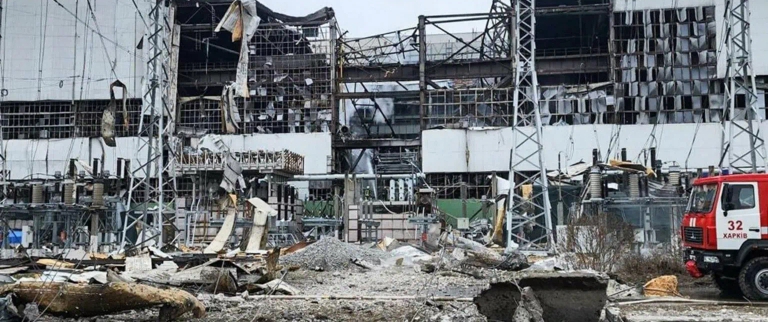By Adeyemi Adekunle
Russia unleashed a devastating missile barrage on Ukraine’s energy infrastructure and cities on Christmas Day, causing widespread destruction, at least one confirmed death, and leaving millions in freezing darkness. Ukrainian officials reported extensive damage as cruise and ballistic missiles targeted key regions, marking one of the harshest escalations in the nearly three-year war.
Air raid sirens echoed across Ukraine early Wednesday as Russian Kalibr cruise missiles were launched from the Black Sea, striking critical energy facilities. The attacks left already battered cities and towns grappling with further devastation amid subzero winter temperatures. The assault highlights Russia’s ongoing strategy to cripple Ukraine’s power grid, which has faced relentless bombardment throughout the conflict.
In Kherson region, officials confirmed one fatality and three injuries over the past 24 hours. In Dnipropetrovsk, a key target of Moscow’s strikes, Governor Sergiy Lysak warned residents to stay in shelters as missiles continued to rain down. “The enemy is trying to destroy the region’s power system,” Lysak said, emphasizing the deliberate targeting of infrastructure vital to survival in freezing conditions. The region also mourned casualties from a Christmas Eve strike that killed a 43-year-old man and injured 17 others.
Ukraine’s northeastern city of Kharkiv faced a “massive missile attack,” according to Mayor Igor Terekhov, with explosions reverberating across the city. The regional governor reported seven strikes, leaving at least three injured. Residents braced for further ballistic missile impacts as authorities scrambled to address the damage.
Since the war began in February 2022, Russia has repeatedly targeted Ukraine’s energy infrastructure, causing widespread power outages and creating a humanitarian crisis during the harsh winter months. Moscow’s campaign has escalated in recent weeks, with nearly 200 missiles and drones deployed in November alone. The attacks have left millions without power, heat, or access to essential services, pushing the nation’s energy system to the brink of collapse.
The ongoing destruction has prompted Ukraine to call for stronger support from its international allies. Advanced air defense systems, including the U.S.-supplied Patriot missiles, are being deployed, but officials stress the urgent need for immediate action to counter Moscow’s increasing aggression. President Volodymyr Zelensky has repeatedly emphasized the importance of bolstering Ukraine’s defensive capabilities to protect civilian infrastructure and prevent further humanitarian crises.
The timing of the intensified attacks is significant as both Russia and Ukraine vie for strategic leverage ahead of potential changes in U.S. foreign policy. With Donald Trump set to assume the U.S. presidency in January, uncertainty looms over how his administration will address the conflict. Trump has pledged to end the war swiftly, though he has not detailed his approach to achieving peace or managing the geopolitical fallout.
Moscow, meanwhile, continues to claim territorial gains, asserting control over more than 190 Ukrainian settlements this year. Ukrainian forces face mounting challenges, including manpower and ammunition shortages, as they work to defend their positions on the frontlines. Russia’s defense ministry claimed on Wednesday that its forces had shot down 59 Ukrainian drones overnight, further underscoring the disparity in military capabilities.
For Ukrainians, the human toll of the conflict is immense. The loss of critical infrastructure has left entire regions in darkness, with families forced to endure freezing temperatures without electricity or heat. Hospitals struggle to provide care under the constant threat of missile strikes, while schools remain closed in areas under heavy bombardment. The strikes have turned a season traditionally marked by celebration into a time of profound hardship and resilience.
Despite the devastation, Ukrainians continue to demonstrate remarkable resolve. Volunteers distribute food, clothing, and other essentials to those in need, while engineers work tirelessly to restore power to affected areas. “We may be in darkness, but we will not give up,” said one Kyiv resident. “This is our land, and we will endure.”
The attacks have drawn sharp condemnation from the international community, with calls for increased sanctions against Russia and heightened military aid to Ukraine. European leaders have described the strikes as a deliberate attempt to weaponize winter and force Ukraine into submission. NATO Secretary-General Jens Stoltenberg reaffirmed the alliance’s commitment to supporting Ukraine, labeling Russia’s actions a violation of international law.
As the war grinds on with no clear resolution in sight, concerns grow about the potential for escalation and the strain on Ukraine’s allies. The financial and humanitarian costs of the conflict continue to mount, while the threat of a broader confrontation between NATO and Russia looms over the international community.
For Ukraine, the immediate focus remains on survival and recovery. Efforts to repair damaged energy infrastructure are underway, with emergency teams working around the clock to restore electricity and heat. President Zelensky, in a televised address, vowed to persevere despite the challenges. “We may be cold, but our spirit is not broken,” he said. “This is our fight for freedom, and we will continue until victory is ours.”
The Christmas Day strikes underscore the devastating human cost of the conflict and the resilience of a nation determined to defend its sovereignty. As the world watches, Ukraine’s struggle stands as a stark reminder of the fragility of peace and the enduring strength of those who fight to protect it.




